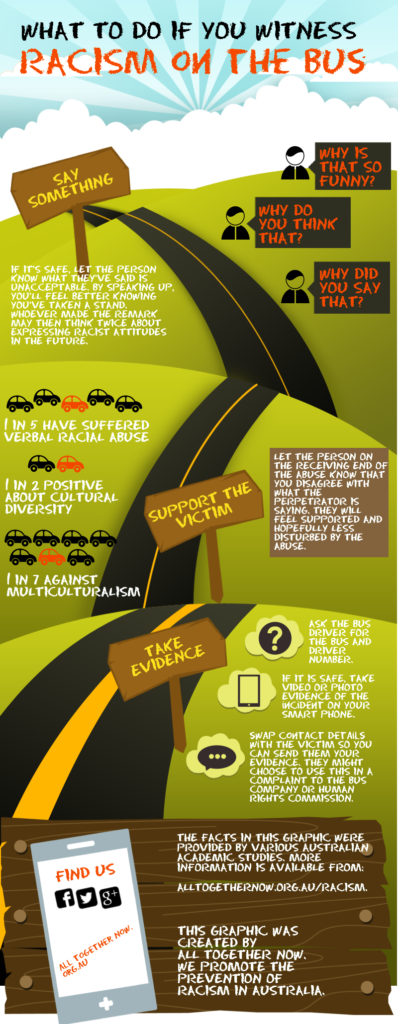What can I do?
 Speak up
Speak up
If you are a witness of racism in public transport and you think it is safe, you should speak up against the discriminatory act or comment and express support for the target. It may also be useful to collect evidence of the incident (such as a recording on your mobile phone) and share this with the target should they wish to make a complaint. All Together Now has a few tips on how to speak up against racism on public transport which you can find here.
Make a complaint to the relevant government agency
There is no government agency responsible for monitoring racism in public transport, however, it is possible to make a complaint directly to the body responsible for the public transport service you were using when the incident took place. Public transport services in Australia are managed by state and territory governments, therefore, a complaint will have to be made to the appropriate state or territory agency.
If you are a target or a witness of racism on public transport and wish to make a complaint to the relevant agency, you can do so by selecting the appropriate state or territory below:
- ACT (complaints can be made anonymously)
- NSW (complaints can be made anonymously)
- NT (after completion, submit complaint form to [email protected])
- QLD (complaints can be made anonymously)
- SA
- TAS
- VIC
- WA
Each state or territory has its own rules and policies on how to handle complaints, therefore, the results can vary greatly from state to state.
Take your case to a federal or state court
Any matter related to racism can be reported to the Australian Human Rights Commission (AHRC) or other state anti-discrimination bodies. You can click here for more information about how to make a complaint to the AHCR or to a state body.
After you have done that, in some cases it might be possible for you to take your case to court. As court procedures can be complicated and vary greatly from state to state, we recommend that if you wish to seek redress through the court system, you first seek advice from your nearest Community Legal Centre and/or Legal Aid to get further assistance on how and to whom you should make a complaint.
Before making the decision to start a court procedure, it is important to keep in mind that these procedures can be quite costly and lengthy. If this does not seem to be the best option for you, there are alternative dispute resolution methods available at anytime.
Go to the police
In some cases, a racially discriminatory act will constitute a crime and can be reported to the police. Which acts constitute a crime will vary depending on the state or territory you are in. If you wish to go to the police, we advise that you consult with a lawyer or your local police station first.
Make a complaint to the Islamophobia Register
In addition to the above legal and institutional reporting options, if the incident was Islamophobic you might also consider sending a complaint to the Islamophobia Register. Making a report to the Islamophobia Register ensures that incidents of Islamophobia and Anti-Muslim sentiments are securely recorded and analysed to build a body of knowledge about Islamophobia in Australia.
Research
According to a survey from 2015-2016 commissioned by SBS with Western Sydney University, the place where people most frequently experience racism in Australia is in public transport and on the streets. Some of the stories of racism in public transport can be read on the “Racism. It stops with me” website, a campaign led by the Australian Human Rights Commission (AHRC) to eradicate racism in Australia.
The law
Despite the high number of racist incidents in public transport, the Racial Discrimination Act (RDA) makes it unlawful to refuse access to or use of public places, vehicles or facilities on the basis of race, colour or national or ethnic origin. Similarly, it is unlawful for a person who provides goods or services to the public to refuse to supply goods or services on discriminatory grounds. This means the following acts are unlawful when performed by reason of race, colour or national or ethnic origin:
- Denying access to public transport;
- Offering less favourable terms and conditions of public transport;
- Requiring a person to leave a public vehicle.
Even though no one can be refused service for discriminatory reasons, public transport providers can deny service to someone who acts with disruptive behaviour or does not pay the transport fee.


